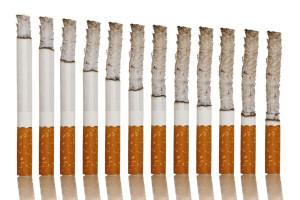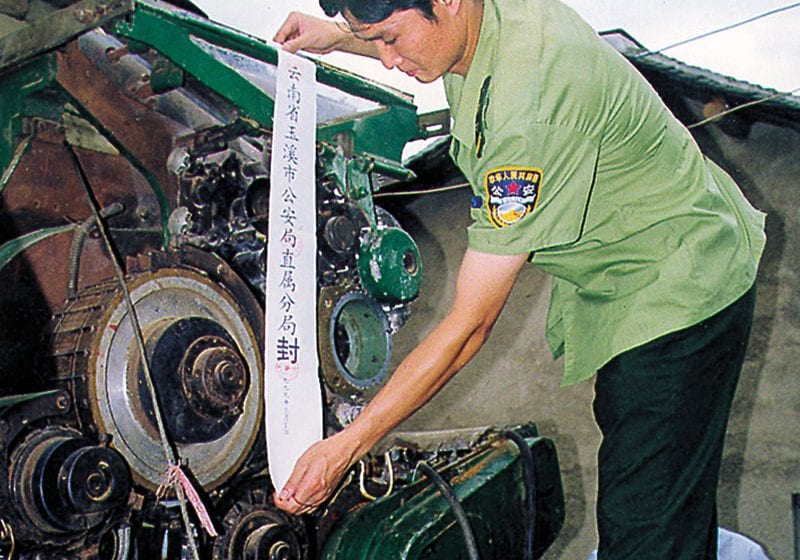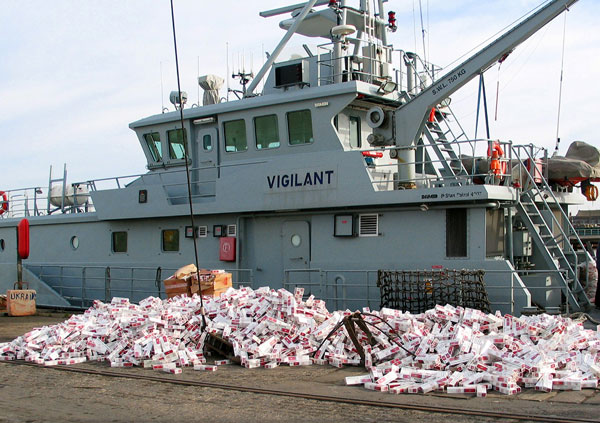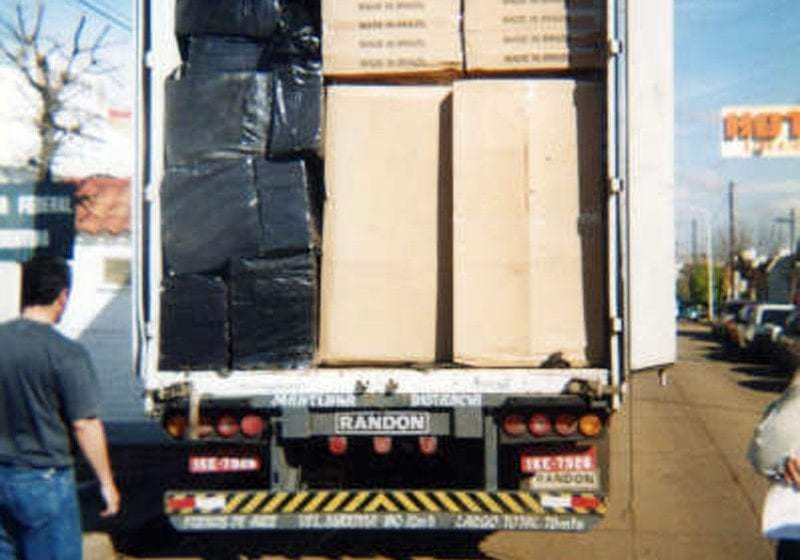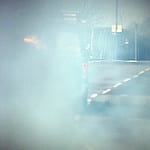An attempt to cut smoking in Iran by raising cigarette taxes seems instead to have encouraged a significant number of smokers to buy illicit products, according to an AzerNews story.
AzerNews reported that the number of cigarettes imported into Iran during the first half of the current fiscal year (March 21-September 22) had dropped to zero, from 1.5 billion during same period of the previous year.
At the same time, the head of the Tobacco Products Manufacturers Exporters and Importers Association Mohammad Reza Tajdar said the Association’s members had experienced a 16 percent cut in production and sale of tobacco products.
By the end of this year, the cut would have reached 30 percent, he said.
Iran’s domestic cigarette production during the first half of the current year was 19.6 billion cigarettes, while production during the same period of last year had been 23.4 billion.
The policy of raising cigarette prices to cut consumption had pushed the country’s cigarette market toward low quality smuggled products.
If this continued, the producing factories would face serious problems in paying salaries.
About 15,000 people are employed in the country’s tobacco industry.
Category: Illicit Trade

Licit sales in free-fall

UAE on track
A system of marking tobacco products that enables them to be tracked from their place of production to their point of sale will go into effect in the UAE on January 1, according to a story in the Gulf News.
The relevant rules state that, as of May 1, 2019, it will be illegal to import designated excise goods into the UAE that do not have such markings. In addition, as of August 1, 2019, it will be illegal to supply designated excise goods in the UAE that do not have such markings.
The rules were announced by Shaikh Hamdan Bin Rashid Al Maktoum, the deputy ruler of Dubai, Minister of Finance, and chairman of the Federal Tax Authority (FTA).
The rules will apply initially to cigarettes but there are plans to expand the system to take in all tobacco products.
The scheme is said to be aimed, in part, at establishing an ‘integrated, accurate and effective control framework’ that supports efforts to combat tax evasion.
Under the scheme, pack markings will be registered in the FTA’s database.
Machine export ban sought
China is to be asked to stop the export of cigarette-making machines to the Philippines, according to a story in The Manila Bulletin quoting the Philippines Customs Commissioner Rey Leonardo Guerrero.
The Commissioner said on Saturday that the Customs Bureau would ask its counterpart in China to stop such exports in a bid to crack down on the manufacture of fake cigarettes in the Philippines.
He said in a statement that the Bureau was trying to end ‘the smuggling of cigarette-making machines that are used in the manufacture of fake tobacco products’.
The Bureau, he added, was expected to inform its counterpart in China about ‘the illicit scheme’.
In addition, the Commissioner said the Bureau would ask Chinese officials not to allow the export of cigarette-making machines without ‘proper and complete documentation’.
During a raid by Customs agents in August, a group of Chinese nationals were said to have been caught red-handed while manufacturing fake cigarettes in a warehouse equipped with tobacco-making machines in Gapan City, Nueva Ecija. Presumably the machines were of Chinese origin.
Seventeen Chinese nationals were said to have been rounded up during the raid.
Fake cigarettes carrying a number of brand names, six cigarette-making machines, cigarette raw materials, and fake Bureau of Internal Revenue tax stamps were found inside the warehouse.
Excise reforms praised
A tobacco company has commended a government for reforms made to tobacco excise.
According to a story in The Post Courier, British American Tobacco PNG has commended the Government of Papua New Guinea and Deputy Prime Minister and Treasurer Charles Abel for introducing positive reforms to the country’s tobacco excise regime.
The reforms, aimed at helping to provide sustainable revenues, were announced on Tuesday as part of the 2019 budget.
In part, the reforms were a step toward clamping down on the rise of untaxed and illicit tobacco products being sold in the country, BAT PNG’s GM Stephanus Duvenage was quoted as saying.
“Illicit tobacco trade has been depriving the country of much needed revenue and has affected the legitimate industry for many years,” Duvenage said.
“These excise reforms announced by the Treasurer will help level the playing field and will enable the legitimate industry to compete against illegal tobacco products which do not pay excise and therefore do not contribute to the PNG economy.”
Duvenage said BAT PNG had been operating and contributing to the PNG economy since 1963.
“The reforms as announced by the Treasurer will ensure companies like BAT PNG continue to contribute and invest in the country for many more years to come,” he said.
“The O’Neill Abel Government has taken meaningful steps to tackle the fight against illicit tobacco and to recover revenue that rightfully belongs to the people of PNG.”
The story did not mention what form the reforms had taken.
Co-operation reinforced
The co-operation between the European Anti-Fraud Office and Montenegrin Customs has recently been reinforced, according to the EU Commission.
The Commission was responding to concerns raised by a Portuguese member of the EU Parliament about a possible increase in the number of cigarettes being smuggled into the EU from Montenegro.
In a preamble to three questions posed to the Commission, Ana Gomes said the Commission’s 2018 report on Montenegro had highlighted continuing issues surrounding illicit tobacco products entering the EU from the country’s free-trade zone at the port of Bar, and OLAF’s [European anti-fraud office] co-operation with national customs authorities with a view to controlling the flow of these products.
‘Media reports confirm that the Government of Montenegro has authorised a new free-trade zone in Podgorica to begin operations,’ she said.
‘The Podgorica free trade zone is all the more concerning as it contains a cigarette factory, which reportedly began production trials in late May 2018.
‘These developments present a new threat which could result in an increase in the number of cigarettes being smuggled into the EU from Montenegro.’
The MEP asked:
* ‘Can the Commission confirm that it is aware of the establishment of a new free-trade zone in Podgorica?
* ‘Can it provide details of the measures it intends to take with the Montenegrin authorities to put in place adequate controls on the flow of products from the new cigarette factory located in the new free-trade zone in Podgorica?
* ‘Can it indicate how the illicit trade in tobacco products will be addressed in the context of the accession negotiations on Montenegro’s candidature to join the EU?’
In reply, the Commission said that within the framework of EU accession negotiations, the Commission closely followed customs developments in Montenegro with regard to the relevant aspects of EU law. ‘It has therefore followed developments regarding the Novi Duvanski Kombinat free zone in Podgorica, and has been kept informed by Montenegrin Customs Administration of the measures that are being put in place there to strengthen inspections, in line with EU standards,’ it said.
‘Montenegro is a signatory to the World Health Organization Framework Convention on Tobacco Control (FCTC) and ratified the FCTC Protocol to Eliminate Illicit Trade in Tobacco Products in October 2017. The Montenegrin Law on Free Zones is broadly aligned with EU provisions and Montenegro’s special customs procedures on warehousing and inward processing are broadly aligned with the European Union’s customs code.
‘The issue of illicit trade in tobacco products is closely monitored by the Commission, and the co-operation with Commission services, notably The European Anti-Fraud Office and Montenegrin Customs, has recently been reinforced.’
Illegal trade up in GCC
The illegal trade in cigarettes has cost GCC (Gulf Co-operation Council) governments $210 million in ‘lost’ revenue since excise tax was introduced in the region last year, according to a story in the Arabian Business magazine citing a report attributed to Philip Morris International (PMI).
The report, which was based on research carried out in collaboration with Oxford Economics, was aimed at monitoring consumption, sales and ‘lost’ tax revenues as a result of the illegal trade.
The story said that the share of the overall cigarette market taken by illicit products during the first half of 2018 stood at 5.3 percent, up from 1.6 percent – presumably during the first half of 2017.
Part of the reason for this rise is because cigarette consumption has dropped overall in the region.
Saudi Arabia, with 6.6 percent, has the highest level of illegal sales, while Kuwait, which has some of the cheapest cigarettes in the region, has the lowest level of illegal sales, 1.0 percent.
Cigarette consumption in Saudi Arabia fell from 34.0 billion in 2015 to 27.5 billion in 2017 but illicit consumption increased there from 484 million cigarettes in 2016 to 571 million cigarettes in 2017.
No trace of tracking system
Despite falling short of its tobacco revenue target, Pakistan’s Federal Board of Revenue (FBR) has failed to introduce the track and trace system that was designed specifically to curb tobacco-tax evasion, according to a story in Pakistan Today (PT).
In fact, PT, quoting ‘sources,’ said the FBR had not completed the bidding process for the system, which was supposed to have been launched 10 months ago.
A Senate committee on finance had asked the FBR to complete the bidding process and enforce the tracking system to avoid tax evasions.
But the sources had disclosed that only one bidder had participated in the bidding process, and that that bidder had failed to meet the ‘tough’ qualification criteria.
The sources were quoted as saying that in the light of this, the FBR might issue a new tender after making some changes to the original tender specifications.
The FBR’s tobacco-products track and trace system aims to prevent the under-reporting of production and sales, along with revenue leakage.
The system is aimed, too, at ensuring the proper payment of federal excise duty (FED) and sales tax on tobacco products, while curbing the illegal tobacco trade that places registered businesses at a competitive disadvantage.
Illegal trade up sharply
The illegal trade in tobacco products in Russia captured nine percent of the market this year, according to a TASS report quoting the vice president of Japan Tobacco International, Brendan LeMoult.
“Illicit tobacco market in Russia has grown up from 1-2 percent to nine percent in 2018,” LeMoult told the Global Illicit Trade Summit 2018 in Abu Dhabi on Tuesday.
Meanwhile, JTI’s vice president of corporate relations and communications in Russia, Sergei Golovko, said that Russia’s cigarette market had stood at 275 billion cigarettes in 2017, down three percent from that of 2016. However, the value of cigarette sales in the country had grown during the same period by 10 percent to 1.2 trillion rubles.
Golovko said that the TNS Kantar research agency had found that the illegal tobacco market in Russia had increased seven-fold between 2016 and the first quarter of 2018. The bulk of the illicit products, it added, had come from states that were members of the Eurasian Economic Union (EAEU), notably Kazakhstan and Belarus, which had accounted for 38 percent.
At the same time, 31 percent of illicit cigarettes were manufactured by domestic producers, while 25 percent had been supplied from the United Arab Emirates (UAE), Serbia, Romania, Bulgaria and Tajikistan.
Golovko said that ‘free economic zones’ in the UAE had become the fastest-growing channel for illicit cigarettes entering Russia. This year, illegal cigarette shipments from this country had increased seven-fold and had taken 5.7 percent of the overall illicit market. In the past year, nearly 200 million cigarettes from the UAE had been seized, up 150 percent on those seized in the previous year.
No export relief
The EU Commission has said that it is not possible to exclude tobacco products for export from the requirements of its pack traceability system.
The Commission was responding to a Danish member of the EU Parliament who had asked the Commission whether the requirement for unique, tobacco-product identifiers would be waived in the case of products manufactured in the EU but intended for export to countries that did not allow such markings.
In a preamble to his questions, Bendt Bendtsen said the rules of the Commission Implementing Regulation (EU) 2018/574 of December 15, 2017, on technical standards for the establishment and operation of a traceability system for tobacco products required in Article 6(1) that manufacturers marked each pack produced in the Union with a unique identifier.
‘What does the Commission intend to do in order to ensure that no tobacco products produced in the EU are prevented from being imported into non-EU countries as a result of the new track and trace rules, which require all EU-manufactured products to show a mandatory unique identifier?’ he asked.
‘Does the Commission intend to take steps to suspend said requirement for products manufactured for import into countries which, as of 20 May 2019, do not allow imports of tobacco products produced in the Union as a result of the EU requirement of a unique EU identifier?’
In response, the Commission said that the ‘inclusion of tobacco products for export in the scope of the traceability system was fully in line with both the Tobacco Products Directive 2014/40/EU and the [World Health Organization’s] Framework Convention on Tobacco Control (FCTC) Protocol to Eliminate Illicit Trade in Tobacco Products. ‘Therefore, there is no possibility to exclude tobacco products for export from the requirements to be tracked and traced,’ it said.
‘In this context, it is important to note that the measures adopted are designed to address the issue of illicit tobacco trade in the broadest possible way, thus including exports of EU tobacco products to third countries.
‘The Commission is already in direct contact with certain third countries to ensure that EU tobacco products can continue to be exported. The recent Conference of the Parties to the FCTC, called upon Parties to ensure that the rules on packaging and labelling are applied in a manner compatible with the provisions on product traceability.’
One for all, all for one
A Czech member of the EU Parliament has questioned whether the high number of illicit cigarettes entering France should be principally a matter for the French authorities; as the Commission suggested last month.
In a preamble to his question, Tomáš Zdechovský said that, in its response to parliamentary question E-003300-18 [see TR‘s story of September 21, 2018: Going it alone], the Commission had confirmed that, ‘OLAF [European anti-fraud office] can bring significant added value by helping co-ordinate anti-smuggling operations’.
However, in relation to the cigarettes smuggled from Algeria to France, it had stated ‘France has so far not requested OLAF’s assistance in this regard’.
‘It is estimated that the annual revenue losses to the EU due to cigarette smuggling amount to as much as €10 billion every year; France has the highest volume of illegal cigarettes in the EU, and OLAF has the ‘unique investigative mandate to fight tobacco smuggling into the EU,’ Zdechovský said, before asking:
‘Given that the issue in France is precisely that of tobacco smuggling into the EU, should OLAF not be more proactive?’

